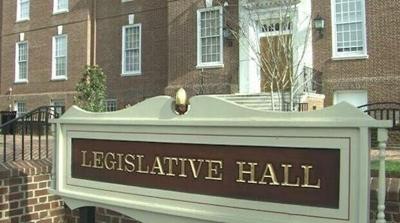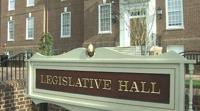DELAWARE - Monday marks the close of the first half of Delaware's 153rd General Assembly. While there have been bi-partisan pieces of legislation that made it through without major controversy, other bills highlighted the political divide in Delaware and beyond. Below are several proposed laws that generated attention.
Status: Passed the Senate on June 10. It is now awaiting a full vote by the House.
Summary: The ability for the state government to override local authority is embodied in the bill. It is also one of the latest salvos in the on-going battle over the construction of a wind farm off the Delmarva coast. In December 2024, the Sussex County Council denied a conditional use request for an electric substation in Millsboro that would be connected to the wind farm project by alternative energy company U.S. Wind. Senate Bill 159 requires the permitting of the substation.
Status: Still awaiting a hearing in the Environment, Energy, and Transportation Committee.
Summary: The national debate over EV mandates is at the heart of Senate Bill 140. 2023 Legislation signed into law by Governor John Carney, requires 43% of new car and light trucks in the state for the 2027 model year be electric or plug-in hybrid. The amount goes up to 82% by 2032. Senate Bill 140 essentially blocks this policy from going into effect. The bill was introduced by Minority Whip Brian Pettyjohn (R-District 19) of Georgetown. It prohibits DNREC from going forward with the eventual ban of new gas-powered vehicle sales.
Status: Passed by both chambers and now awaits the signature of Gov. Matt Meyer.
Summary: Recreational marijuana became legal in Delaware in 2023. Yet many coastal communities have put in place regulations that restrict sales. In 2024, Sussex County Council approved an ordinance bans recreational businesses from operating within a three mile radius of churches, schools, and rehabilitation centers. Senate Bill 75 would eliminate certain zoning restrictions.
Status: Passed by the Senate on June 10. It is awaiting a hearing in the House Administration Committee.
Summary: A proposed constitutional amendment that, according to bill sponsors, would protect marriage equality under state law. It defines marriage as a fundamental right that cannot be denied or limited based on gender or any classification already protected under the Delaware Constitution. These protected categories include race, color, national origin and sex.
Status: Signed into law.
Summary: It allows terminally ill people living the state to request and self-administer pharmaceuticals to end their lives. “This law is about compassion, dignity, and respect. It gives people facing unimaginable suffering the ability to choose peace and comfort, surrounded by those they love," said Governor Matt Meyer. "After years of debate, I am proud to sign HB140 into law.”
Status: Awaiting a hearing the Appropriations Committee.
Summary: All Delaware state government websites would be required to be accessible in any language spoken by at least 0.5 percent of the state’s population, expanding digital access for thousands of multilingual residents. Each English-language state website must feature a prominent link directing users to translated versions.
Status: Signed into law.
Summary: Under the existing law, a business may own one microbrewery and up to two brewpubs (a microbrewery with an attached restaurant). The bill would allow a business to instead operate two microbreweries and one brewpub, if desired.
The change gives businesses the option to choose between:
Two microbreweries and one brewpub,
One microbrewery and two brewpubs, or
Just one establishment, depending on their business model and goals.
Status: Approved by the Senate on May 22. Was reported out of the House Appropriations Committee with 4 voting on its Merits on June 25.
Summary: It would create Delaware’s first independent and nonpartisan Office of the Inspector General (OIG), tasked with investigating and preventing fraud, waste, corruption, mismanagement, and other abuses of government resources. The Inspector General would lead the new office, which is designed to operate outside of political influence.
Status: Signed into law
Summary: Revises Delaware’s General Corporation Law by expanding safe harbor protections for interested director and controlling stockholder transactions, and by clarifying the rights of stockholders to access corporate books and records. The state’s unique Chancery Court, which exclusively handles business lawsuits, has been a key factor in attracting corporations. In recent months, major corporations have started relocating to states like Texas and Nevada. The shift gained momentum after a Delaware Chancery Court judge ruled against Elon Musk’s $56 billion Tesla pay package, prompting him to move Tesla and SpaceX out of the state.
House Substitute No. 1 for House Bill 1
Status: Passed by both chambers and now awaits the signature of Gov. Matt Meyer.
Summary: The creation of a new Department of Veterans Affairs, a cabinet-level agency, designed to centralize and strengthen services for veterans across the state. The new department will consolidate the work of the existing Delaware Commission of Veterans Affairs and the Office of Veterans Affairs, which will continue their current operations under the new structure. The commission will retain oversight of the Delaware Veterans Home and serve in an advisory role to the new department.
Status: Signed into law
Summary: The new law will prohibit Delaware school districts and charter schools from selling or serving any food products containing Red dye 40 during the school day, including breakfast, lunch, and competitive foods like those sold in vending machines or a la carte. The ban will take effect July 1, 2026, with the upcoming school year designated as a planning and preparation period.
Status: Approved by the House on May 22. Reported out of the Senate Elections and Government Affairs Committee with 1 Favorable and 4 on its Merits on June 18.
Summary: The legislation requires libraries to maintain broad, inclusive collections and ensures a consistent and transparent process for reviewing objections to library materials.
The Act establishes core principles for public library collections:
- Materials must serve the interest, information, and enlightenment of all community members.
- Items cannot be excluded based on the origin, background, or views of their creators.
- Libraries must not remove material due to partisan, ideological, or religious disapproval.
House Substitute 1 for House Bill 50
Status: Passed by both chambers and now awaits the signature of Gov. Matt Meyer.
Summary: Establishes the Delaware Energy Fund, aimed at helping households with incomes up to 350 percent of the federal poverty level manage rising energy costs while promoting long-term energy efficiency.
Under 2025 federal guidelines, that income threshold includes individuals earning up to $54,775 and families of four earning up to $112,525. The fund will be administered by the Sustainable Energy Utility and will provide one-time financial assistance per approved application.
Status: Passed in the House on April 8. Reported out of the Senate's Elections and Government Affairs Committee with 3 Favorable votes and 1 on its Merits on May 14.
Summary: It moves Delaware’s primary elections for statewide, county, and municipal offices to the fourth Tuesday in April, aligning them with the presidential primary in election years. The change will take effect for all primary elections held after December 31, 2026.
There are 42 legislative days in the 2025 part of the 153rd General Assembly session. Sussex County issues figured prominently with attempts to override Council decisions on the windfarm substation and marijuana. Also this year will be remembered as the year that Democratic District 20 Representative Stell Parker Selby resigned from office after a major stroke prevented her from appearing at Legislative Hall. While the full legislature is on break for the remainder of the year, commission and task force meetings will take place up to mid-December.







